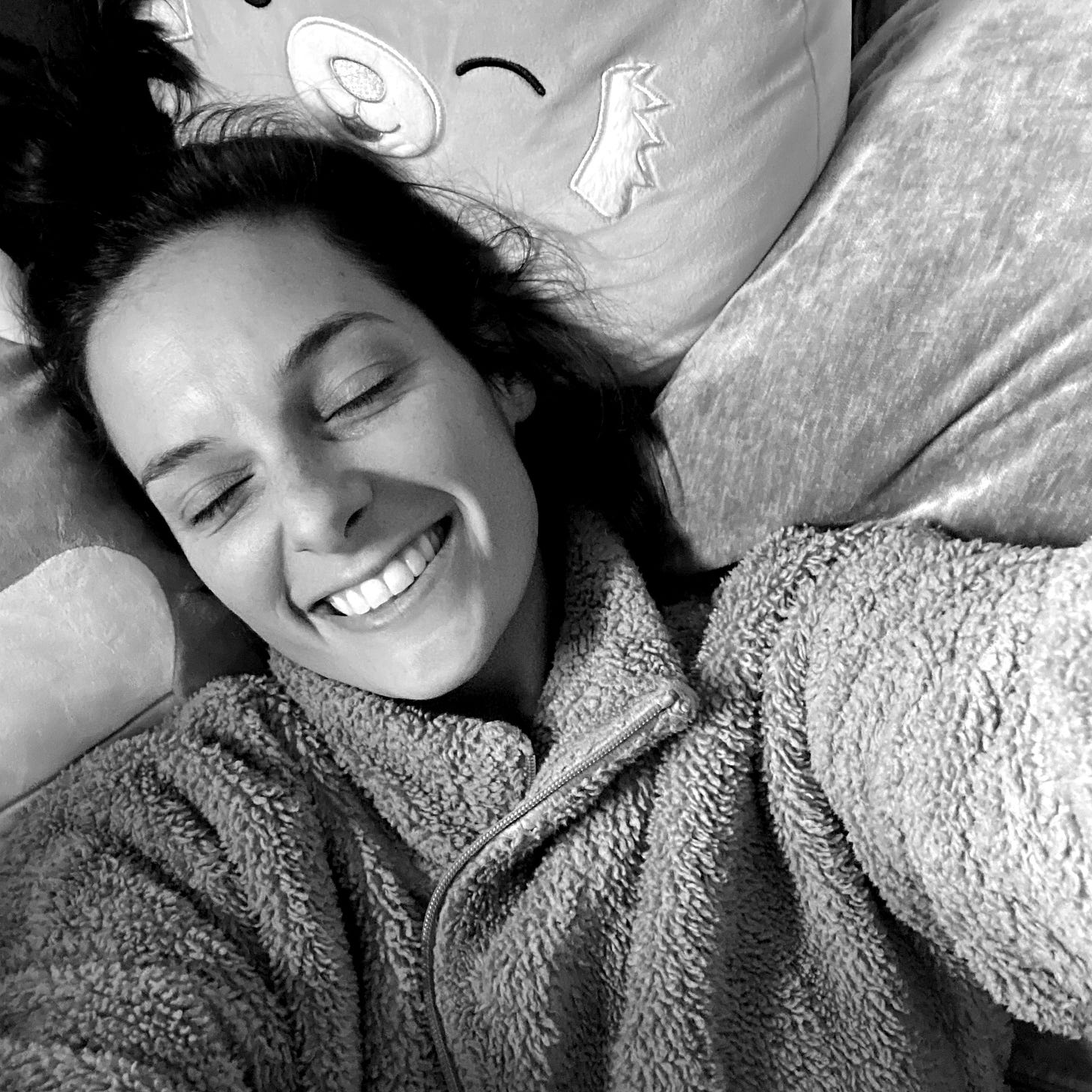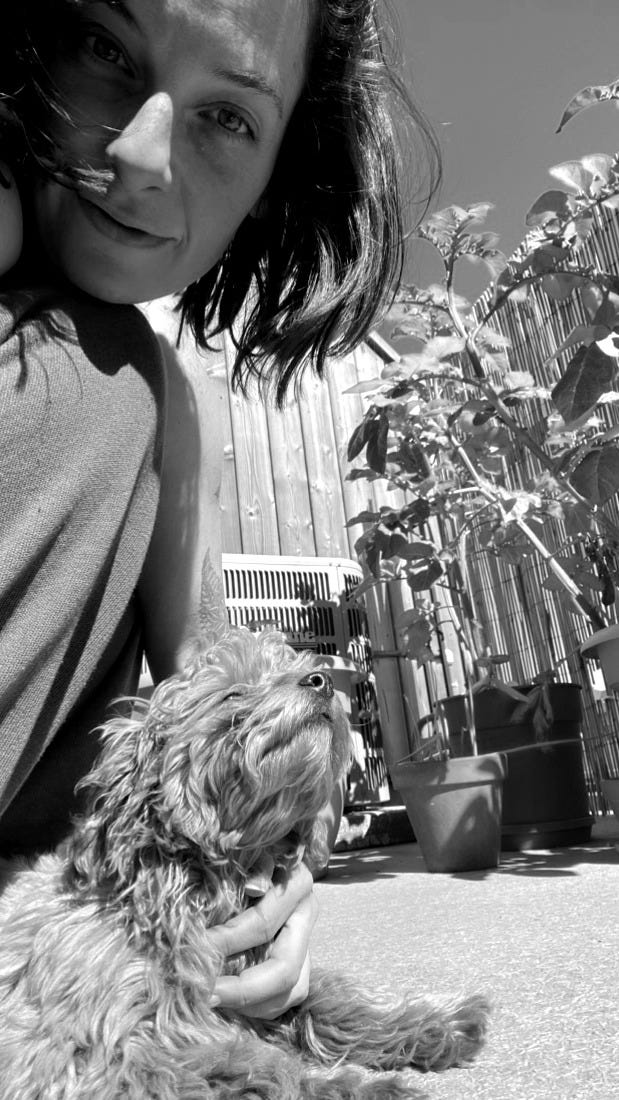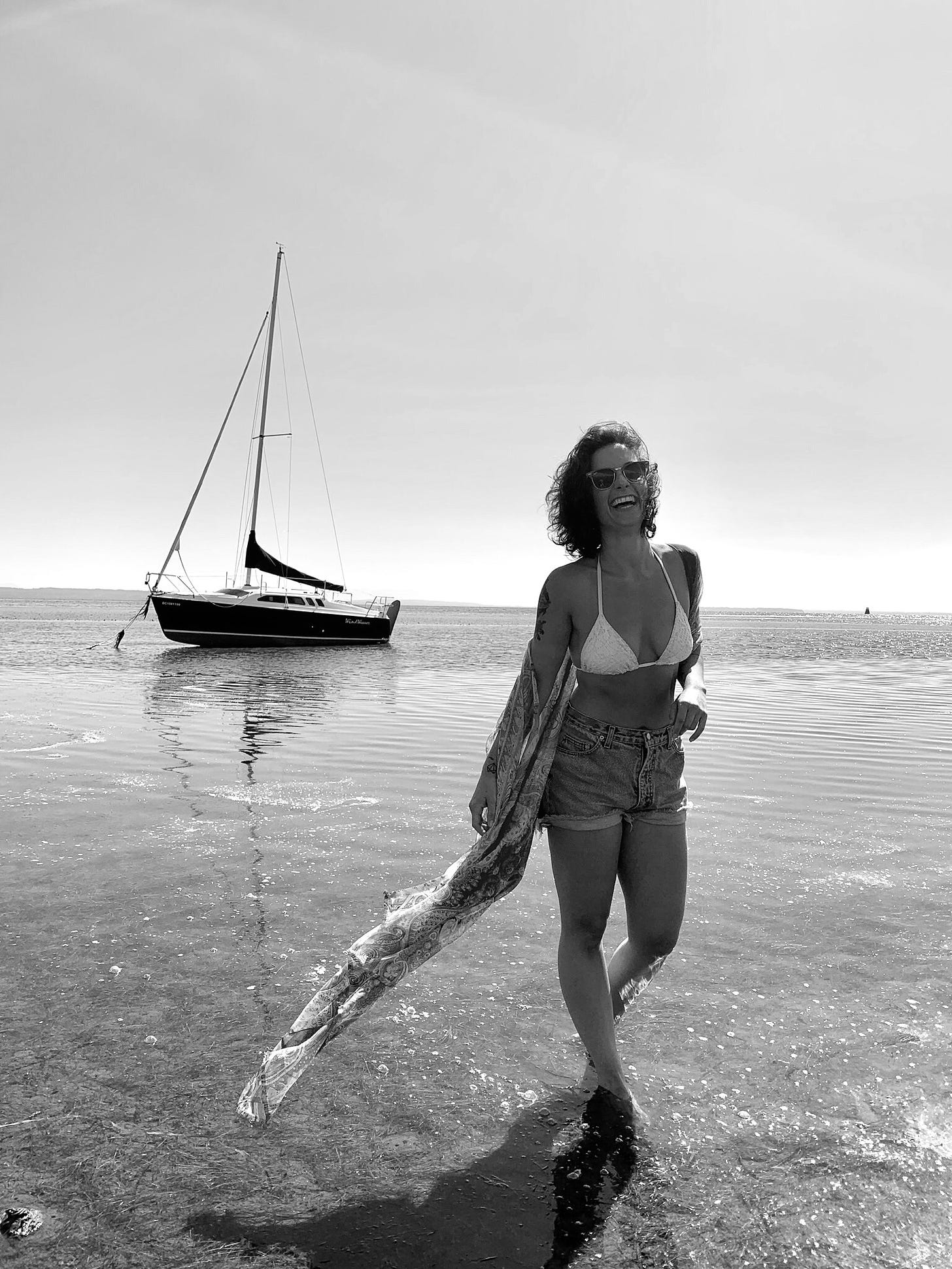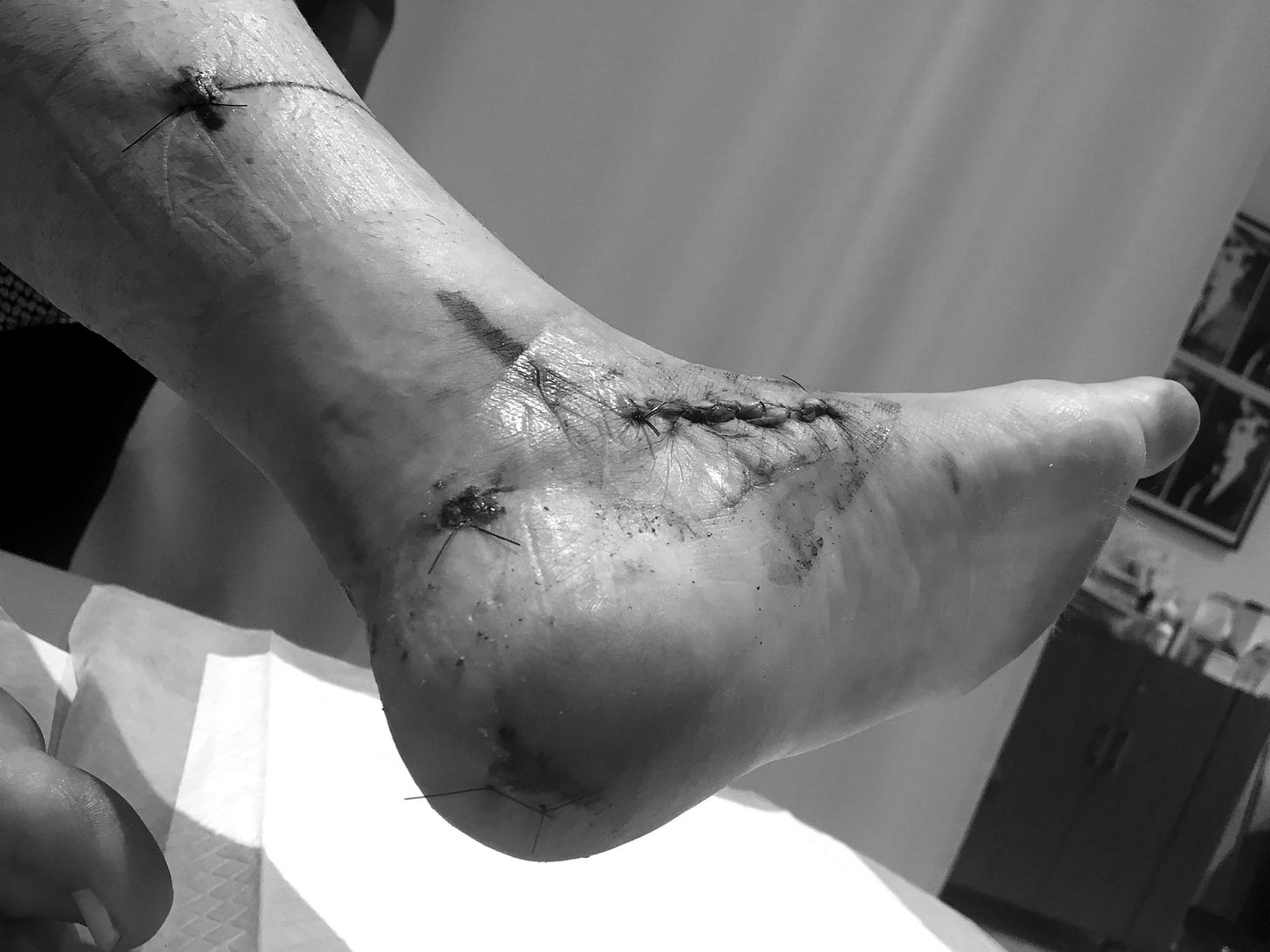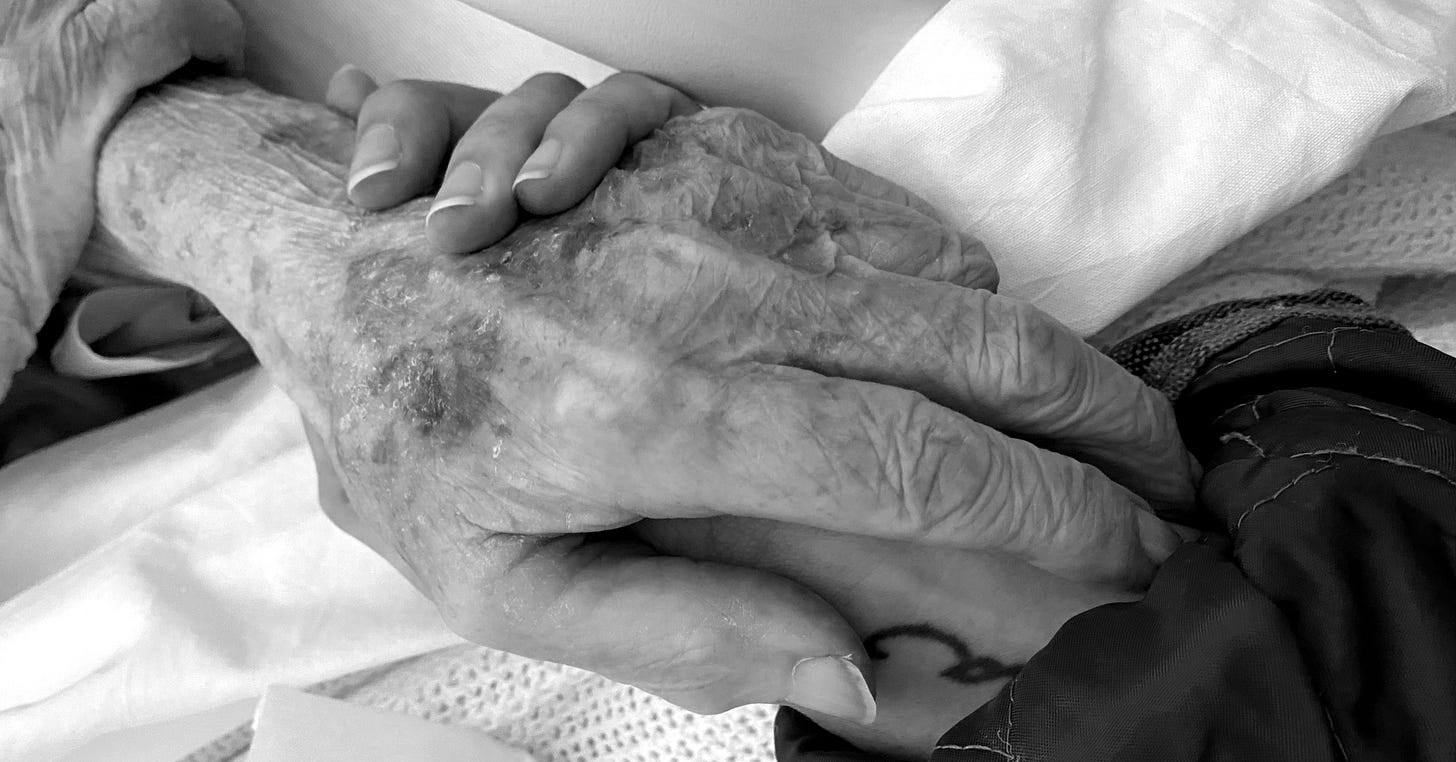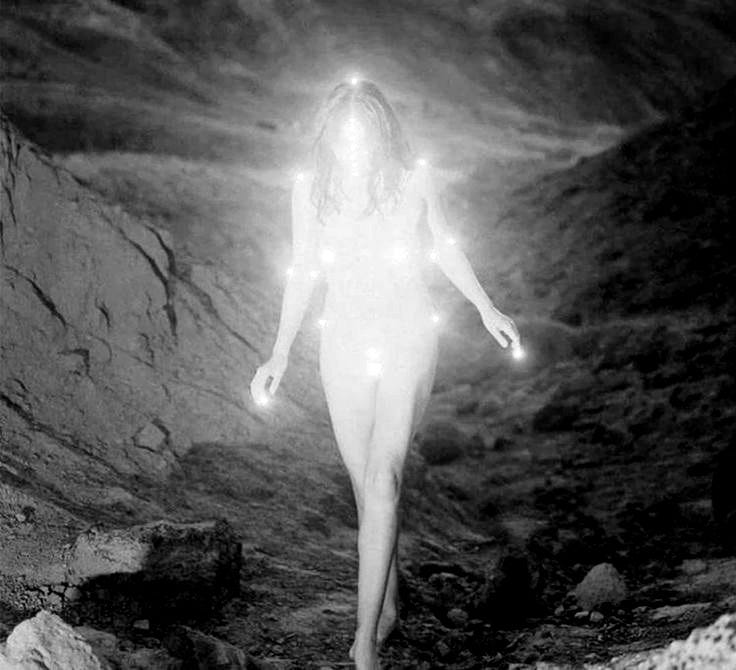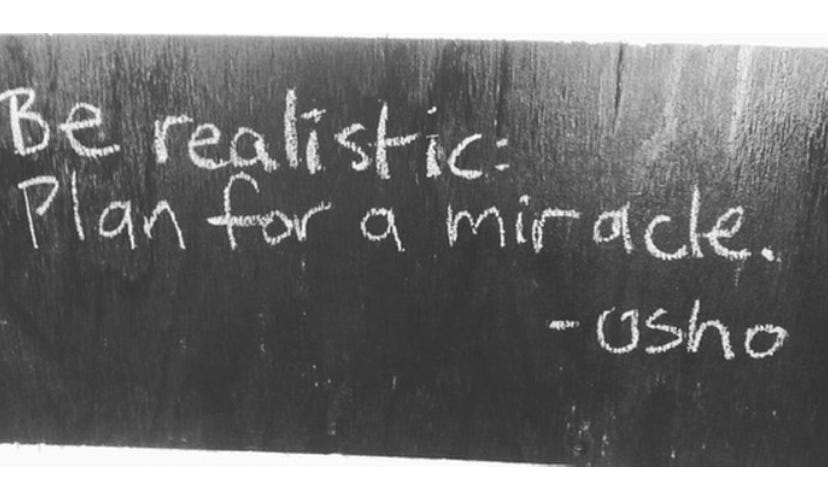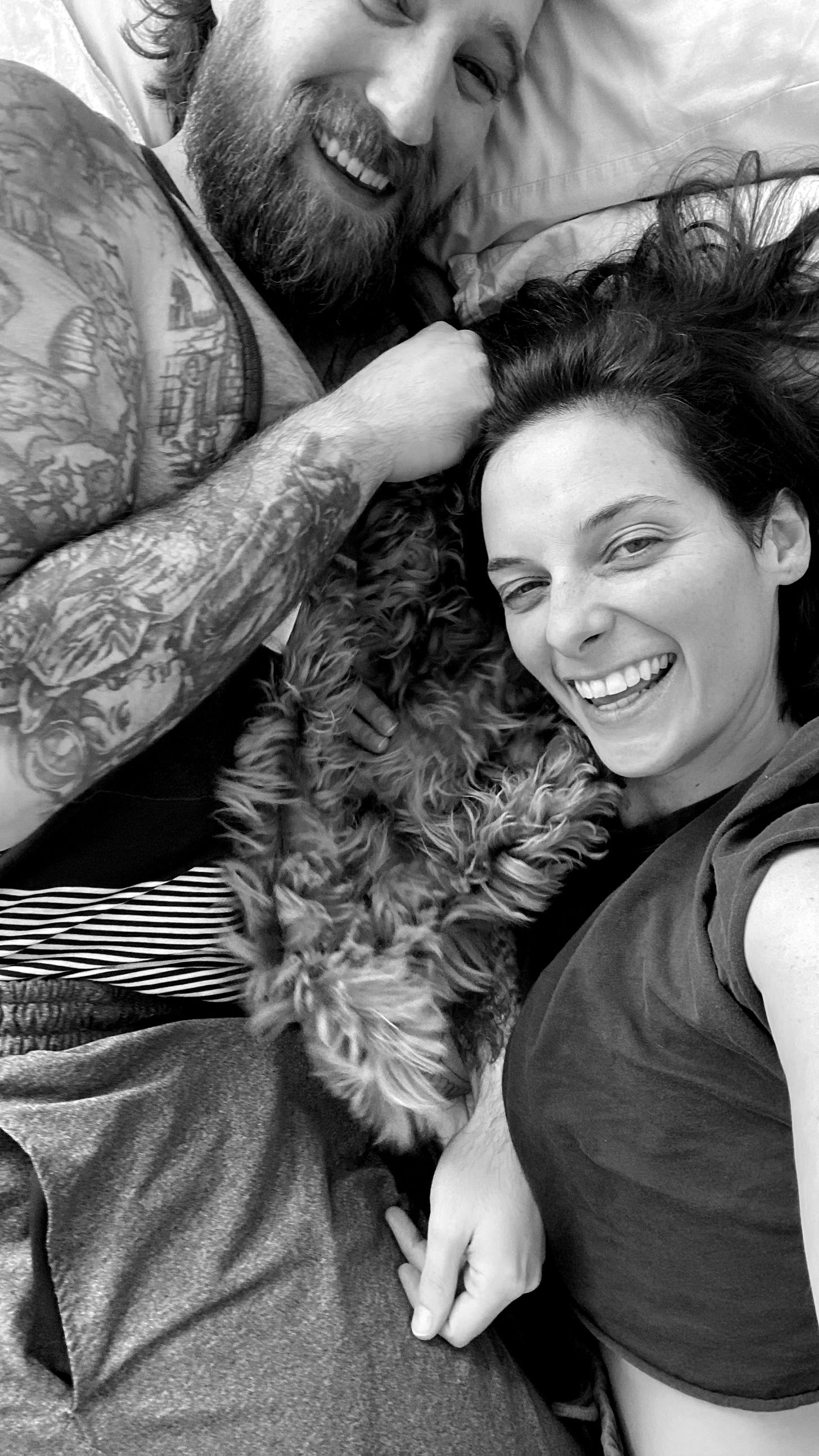4 am conversations with God
9 seemingly random stories my inner creature of habit is toying with & 9 reflections for yours.
I sat under the stars at the beginning of the month, early early in the morning. Before the world woke. It was warm like mid-July and I knew it would be one of the last summery mornings, surely. And of course, the frost appeared just yesterday, September 15.
But anyway I had so much on my mind just before I was set to bleed—typical. And as it was, there were 9 random stories my inner creature had been toying with—each with valuable lessons for us all to chew on.
So yes, if you have an attention span and still enjoy reading long-form, like a carousel post but better, grab a cuppa and settle in.
I will also shamelessly plug my mentorship program throughout, because I want you to know I am open and ready for you. Message me on Instagram “LOVE LETTER 💌” to fill out the application and get started—your first session on me.
Here goes.
1. Yesterday, we learned that our sweet neighbor had a stroke at 65. The conversation we had with his wife was both heartwarming and grounding. It reminded me how unpredictable life can be—and how deeply grateful I am for my body, my breath, and the incredible ways our bodies communicate their needs, even through the experience of illness.
This year, I’ve felt an even stronger call to care for my body with greater intention. After navigating so much upheaval, my body is asking for a different kind of care than I’ve given before, then I have been able to give before. Taking a year off work without savings or credit was humbling—it taught me about simplifying—but it also left me feeling a bit depleted. Now, I feel the nudge to replenish and rebuild with better nutrition, supplements, chiropractic care, and more rehabilitative movement. My hormones need balance, my cells need hydration, and I’m ready to establish self-care practices that nourish me from the inside out.
Reconnecting with our bodies is a sacred partnership and a privilege to be honored with patience and gratitude. It’s about truly listening to the signals we’ve ignored or bypassed and allowing the body to guide us in healing. While the body is resilient, it’s also complex, ever-changing, and often surprising. Our health and needs shift or we risk being caught off guard if we don’t honor the subtle ways our bodies communicate to us day in and day out.
What happens when you finally let your body speak? When you stop just managing the stress and start listening to the message beneath it? Our bodies are not a battlefield to push through but a sacred guide, always communicating what we need to thrive—not just survive. The truth is, you deserve to feel more than ‘fine.’ You deserve to feel vibrant, to let go of what’s not yours to carry, and to cultivate a relationship with your body that is rooted in trust and respect.
Creatures of Habit invites you into that dialogue. It’s about learning to adapt with grace, recognizing that our bodies aren’t obstacles—they are wise allies in our evolution and growth. It’s about shedding the layers of stress and obligation that keep you stuck in old patterns, and reclaiming the power to heal from the inside out.
2. Establishing safety in my body is taking time in this new place. It’s been harder than I expected—honestly, I didn’t even know what to expect. I hadn’t actually planned on staying staying. I’ve never felt this kind of discomfort like I have since leaving the coast. My nervous system is still trying to catch up, and there are moments when I feel like I’m not fully grounded—like I’m not as in sync with my own body as I have been in the past.
Moving here stirred up old anxieties and created new ones—starting fresh, figuring out new routines, a new city, and new relationships. Oddly, driving has become something I dread over the past few years, and I’m learning to work through that bit by bit. Getting outside doesn’t feel as easy and as natural as it once did either. Things that once felt so automatic now feel overwhelming.
Safety in my body isn’t something that just shows up. It’s a practice. It means constantly reinforcing to myself that I am safe in this moment, even when everything around me feels chaotic or unfamiliar. It’s not about forcing things to be okay or speeding up the process. My body is learning to trust itself again, and my mind is learning to accept that the body takes the time it takes. It doesn’t follow my perception of time—it follows its own.
What fear are you gripping onto because it feels “safer” to hold it? What happens when you release the need to control and let your body settle into trust?
In Creatures of Habit, we dive into this exact process—how to create safety from the inside out, especially when the world feels too much. It’s not about controlling everything outside of you but building that deep, inner sense of safety you can return to, no matter what’s happening around you. If you’ve ever felt like your body is holding onto fear or uncertainty, trust me, it takes time to rebuild that trust. And that’s okay. Be gentle with yourself. Re-establishing safety is slow and intentional—it’s fundamental in cultivating a sustainable path to peace.
3. Is it a mindset thing or a nervous system thing? After 13 years of mindset work around money, let’s have an honest conversation. The whole “money mindset” concept? I’m exhausted by it. There’s only so much mental conditioning you can do. Reality is more complex than simply shifting your beliefs or using discipline to “make more money.” It’s not just a mindset—it’s a body thing. Especially when your body has been through trauma. No amount of affirmations or visualizations can bypass deeply embedded survival patterns or “mindsets”.
There’s this constant push to have more money, to hustle for multiple income streams, or to invest in every self-help opportunity out there, as if you’re falling behind if you haven’t cracked the six-figure month code or mastered the 4-hour workweek. And if you’re not living with expendable income and available credit? The narrative tells you that you’re lazy or need to work harder on your mindset.
But here’s the truth: it’s not about laziness, and it’s definitely not about a lack of hustle. The constant pressure to monetize every aspect of life is exhausting because it’s out of alignment with our bodies. Our capitalist, consumerist culture thrives on this, but that’s not a reflection of your worth or focus.
Here’s what’s real: no amount of hustle or income streams will bring you true peace if your body-mind is stuck in survival mode. It’s not about subscribing to frugality or poverty, either—it’s about knowing when to set boundaries, to recognize when enough is enough, and to stop chasing productivity, financial success, and consumerism as a measure of self-worth.
The trauma and stress we carry around money run deep in our nervous systems. If your body doesn’t feel safe, it will resist any attempts to bring in abundance—not because you’re failing, but because your body hasn’t yet learned what true safety feels like. When your body isn’t in survival mode, it knows what’s enough, and abundance flows more naturally—not as pressure or obligation but as an extension of feeling grounded.
So, if money hasn’t been flowing the way you’ve been told it should, if those extra income streams haven’t panned out, or if you feel frustration around your financial situation, know that it’s not about trying harder—it’s about redefining how your body relates to safety and abundance. Can you be at peace where you are? I see you. I am with you. This is a collective effort.
In Creatures of Habit, we focus on creating deep, internal safety within the body, where wealth becomes a natural expression of feeling secure and whole; it’s also why the program is offered on a sliding scale—accessible investment options matter. We work through the trauma that keeps you stuck in scarcity—not by pushing harder, but by listening to the signals your body is sending, challenging your edges but working within your means. When you resolve that inner sense of survival, abundance follows—not because of hustle or force, but because you’re in harmony with yourself.
4. I won’t lie. Summers have sucked since moving. Once my favourite season without any shadow of a doubt, it now feels like a reminder of what I left behind. I catch glimpses of my old life—friendships, community, the ocean. Meanwhile, I’m here, still feeling like I’m starting over, even two years later, unsure of who I am without “the coast”. It stirs up grief and frustration—this nagging feeling that I made a huge mistake, that trauma drove my decisions, causing me to blow up my life and land myself in deeper isolation.
There’s that oh-so-familiar voice of self-erasure, self-doubt, and self-hate.
“I should have done more; worked harder; kept my business running no matter what. I’m lazy, un-resourceful, a quitter. Having no money and no work is all my fault.”
These stories creep in, convincing me that life could’ve been “better” if only I’d made different choices. And sure, maybe I could have. But that’s the trap—the belief that we have to deserve the life we want by pushing harder or being more. The truth is, things are exactly as they need to be. The grass isn’t greener on the other side; those paths weren’t meant for me. Every choice I made brought me right here, where I need to be, even if it doesn’t look the way I thought it would.
Are you caught up in a fantasy land of the past or some future trip as a means to avoid experiencing your happiness and peace now? Are you erasing the truth because all you know how to do is berate yourself for anything you do—is that really you?
Creatures of Habit is about releasing these stories of shame and self-blame. It’s about trusting that where we are right now is enough—a deep acceptance—that we don’t need to prove our worth through constant struggle. We rewrite the narrative, letting go of the idea that if life didn’t go as planned, we’ve somehow failed. Instead, we learn to surrender, adapt, and begin again, knowing we’re exactly where we need to be and everything that needs to happen for my highest good, will happen. Real freedom comes through wholehearted acceptance and surrender.
5. What do you do if you can’t comfortably walk 10k steps a day but you desperately want the benefits of walking 10k steps everyday?
Honestly, I feel envious of people who can walk for an hour or more, who can run, hike, or just be on their feet without thinking twice about it—every day if they want to. I used to love long walks, stairs, rollerblading, and sprints, so seeing people do what I once enjoyed feels like a loss. It stirs up frustration in and with my body. It’s confusing because I am strong and able, but also, I am not.
If that peace is really what I’m after (it is), then my version of that is to tend to and rehab my foot, ankle, and hip—far more diligently—with chiropractic and acupuncture too. It’s okay that I’m in pain, and that I don’t walk often. It’s okay my body is different. Not walking 10k steps doesn’t make me “lazy” or sabotaging a desire. Even if there are people with worse ailments than mine, who do incredible things, I am still not lazy or weak. I am not making excuses. I am not, not disciplined. We’ve been conditioned to think that if we’re not hitting arbitrary or ableist health goals, we’re somehow failing.
So maybe my version of walking 10k steps is sticking with my yoga and Pilates and getting to the chiro. The walks I do get in? Bonus. Delight. Come winter, -40 degrees, and metal in my foot means walking is not my form of self-care, and that’s okay. We all have our versions of self-care, and it’s not about checking boxes or doing it for the trend. It’s about honouring the body you’re in, right now, as it is, and finding what works for you. If you can and want to challenge yourself to walk daily, DO IT. I am your biggest cheerleader, duh! But that’s where I need to shift my thinking, maybe you too. It’s not about what I would do “if I could”—it’s about what I can do right now and remembering I chose Yoga and Pilates for this exact reason, to manage my “conditions”.
Instead of fixating on what you can’t do, focus on what’s possible.
In Creatures of Habit, we redefine what it means to care for ourselves, moving beyond societal standards and into true self-honouring. It’s about dropping the idea that success or worthiness is tied to arbitrary goals like steps, weightloss, or fill in the blank. True self-care isn’t a trend—it’s a deeply personal practice of tuning into your body’s needs and honouring where you are, right now. We stop chasing someone else’s version of peace and start creating our own.
6. I’ve got a serious case of comparisonitis—it’s generational. Grandma, Mama, me. My grandmother was adopted, and that experience shaped her life in ways I’m only just beginning to understand. It created a constant undercurrent of feeling like an outsider, of not fully belonging, of always questioning her worth. That pattern didn’t stop with her—it was passed down; the golden thread woven through generations. I see how it affected my mother, and now I feel it playing out in me, especially in how I find myself comparing, feeling envious or judgmental of others who have what I want.
But comparison is always about more than just wanting what others have—it’s about allowing ourselves to desire and believing in our abundance. That money mindset thing, right?
We compare ourselves because we believe others have something we don’t, something we desire but feel is out of reach. In reality, our desires already exist within us just because of the awareness (it’s a quantum mechanics thing). We just need to recognize that what we’re seeking is either already here, and our unique version of it is already taking shape.
These emotions—comparison, envy, judgment—live in the body. The tightness in my chest, the clenching in my jaw, the weight on my shoulders—it’s all psychosomatic, just like it was for Grandma, and now me. I see it in her collapsed chest and kyphotic spine.
But what if you could release your patterns of judgment before it takes shape in the body? What if you could recognize that your desires aren’t out of reach—they’re already here, waiting for you to receive them fully? Rewriting those stories and living in alignment with your true desires is about being where you are and forgiving yourself for self-imposed shortcomings.
In Creatures of Habit, we dig deep into this work. We find the evidence that what you desire is either already in your life or will manifest in a form that aligns with who you are. You belong. It’s about shifting the focus from lack to abundance, recognizing that what you have is what you want, and what you want is already part of your path. We stop chasing the mirage of someone else’s life and start appreciating the life we’re building for ourselves.
7. Let’s talk about the body and the “kinetic chain.” Everything is connected. This is Eastern medicine in a nutshell, yet Western medicine wants to compartmentalize your body. But where there’s one thing, there’s another and another. For me? Collapsed arches, mid-foot sprain, ‘bunionette’, tight calves, hip instability, sciatic pain, sacral instability, slight scoliosis, shoulder and neck tension. That’s the whole line of pain physically… I won’t even get into it much more.
Cause here’s the important truth: where you feel the pain might not be where the injury actually is. AKA What you think is wrong isn’t necessarily what’s actually wrong.
Right now my right shoulder and neck are real icky sticky, totally “out”, but to me, it’s not a mystery why. So I can manage my symptoms far more efficiently.
You need someone who can weave your pieces together and find the golden thread that connects things somatically, psychologically, and spiritually.
Can you step back and see that the load you carry, is not yours alone?
That’s the work I do in Creatures of Habit. I don’t just treat symptoms. I look for the thread—the deeper connection between seemingly unrelated issues—and begin to unravel the patterns that have kept you in pain. It’s about bringing the body back into balance, one step at a time. It’s about seeing the bigger picture so you can offer yourself and others, far more grace.
8. I got suspended from a yoga studio I taught at once upon a time and was told to reflect on who I wanted to be as a teacher. I’ll tell ya what, five years later, I’m 100% not here to inspire, motivate, or necessarily even “uplift” others. I’m here to lead people who want to be lead. And that requires being a little more hard-hitting and boundaried.
When I was an active Yoga Teacher, all I was trying to do was inspire, help, to motivate change. No wonder I burned out—so much attachment, so soft, too open for too many people. I see how that need to inspire was a form of my codependency—wanting others to feel good so that I could feel worthy. It’s exactly what people loved too.
These days, I’m centering and grounding my energy a lot more. I work on making my message clear, and I’m only a mirror for those who are ready to see themselves in it. This shift from inspiration to leadership means I’m no longer here to hold anyone’s hand or soften the truth to make it more palatable. Leadership means showing people the raw reflection of their own potential—and their own shadows.
When I burned out as a yoga teacher, I was too open and too attached to how people received my message. I really wanted people to want me, to need me. That need for approval and validation was layers of codependency I needed to move through. Now, it’s about grounding my energy so that I can lead in a way that’s sustainable for both me and my clients.
Ask yourself: where in your life are you overextending or softening your truth to make others more comfortable? Are you seeking validation from others, hoping they’ll see your worth before you see it in yourself? This is the moment to ground yourself, set boundaries, and lead from a place of knowing who you are—without the need to prove it.
In Creatures of Habit, we’re not just working on the surface, but diving deep into the habits, shadows, and patterns that keep you stuck. It’s not about feeling “good” or “inspired” necessarily—it’s about the kind of transformation that comes from truly facing yourself, even in the places you’ve been avoiding. Ultimately, you decide how you feel either way.
9. Big thoughts from a 3/5 on life as a science experiment and Yoga as the science of life:
As a 3/5 Human Design Profile, my life feels like a constant experiment—one I half-heartedly embrace at times. That’s the essence of the 3-line: trial and error, learning through embodying, making mistakes, responding, and adapting along the way. From the outside, it can look messy, chaotic even. People misunderstand this process, labeling me as “uncommitted,” “unfocused,” or “unreliable” because they don’t see the depth of what’s integrating behind the scenes.
Which is the essence of the 5-line—where people project onto me, seeing what they want to see, placing their assumptions and expectations on who they think I should be, especially as a Yoga Teacher. There’s been a projection that I either have everything perfectly figured out, or that I’m all over the place because my journey doesn’t follow the neatly packaged, linear path expected from all of us. But the truth is, my path is about deep exploration. I’m not afraid to see potential, to try, fail, and learn what I need to about myself and life in the process. It’s growth. It’s resilience. It’s learning to trust my own timing.
Yoga, at its core, is the science of life. It’s why I was drawn to it so deeply and why I understood it on an innate level. Yoga teaches us how to live fully in our bodies and to become intimate with our physical and emotional experiences that we move through every day. It asks us to be students of life—allowing the body to become our guide. It’s not about contorting yourself into someone else’s idea of “enlightened”—it’s a peaceful rebellion against the pressures to meet external ideals and expectations, and instead living from a place of authenticity, self-trust, and embodied knowing. It’s about trusting that your body, your experience, is exactly what it needs to be.
So, ask yourself—where in your life are you living someone else’s story? Not allowing yourself to shift, change, or grow because you see it as failing? What projections or expectations are you holding onto that aren’t yours?




